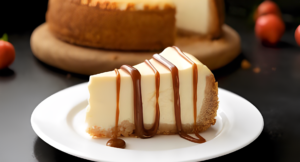|
Listen to article
Getting your Trinity Audio player ready...
|
Are you wondering what happens if you eat expired cheesecake? Well, then you are just in the right place. In this article, I’m going to describe everything that you should know about expired cheesecakes, what might happen, and why you should avoid eating them. Now, Grab a cup of tea and learn more about this topic with me.
Contents
- 1 What Happens if You Eat Expired Cheesecake?
- 2 Understanding Food Expiration Dates
- 3 Signs of an Expired Cheesecake
- 4 General FAQs
- 4.1 Is expired cheesecake still good?
- 4.2 Does no bake cheesecake go bad?
- 4.3 Should cheesecake be refrigerated or frozen?
- 4.4 Can I use expired cream cheese for cheesecake?
- 4.5 Does cheesecake need refrigeration?
- 4.6 Can you eat 2 week old cheesecake?
- 4.7 How long will cheesecake last unrefrigerated?
- 4.8 How do you store cheesecake without a refrigerator?
- 4.9 Why is my cheesecake still jiggly?
- 4.10 Why is my cheesecake jiggly but brown?
- 5 Conclusion
What Happens if You Eat Expired Cheesecake?
Let’s discuss what happens if you eat expired cheesecake. Food poisoning can be caused by eating expired cheesecakes. Here’s a brief overview:
Key Risks:
- Food Poisoning: The symptoms can range from mild discomfort to severe illness. Expired cheesecake is more likely to contain bacteria.
Common Pathogens:
-
- Salmonella: Salmonella is often associated with dairy products, causing serious digestive problems.
- E. coli: Cheesecakes can be contaminated by this bacterium if they work in a kitchen that has been cross-contaminated.
The risk of harmful bacteria growth increases significantly as time passes, according to studies and food safety experts. When it comes to expired dairy products, they advise caution and advise prioritizing safety over taste.
Understanding Food Expiration Dates
You need to understand food expiration dates. Expiration dates are the labels that indicate when a product will no longer be at its peak quality. Freshness and flavor guidelines are not always hard-and-fast rules. Let me explain it further for you in easy words.
Decoding the Dates:
You will have to decode the dates:
- Sell by: This is more for retailers, indicating when the product should be removed from shelves. This is not a safety indicator.
- Use by: This sign Indicates when a product’s quality might begin to decline. In many cases, you can still eat it after this date.
- Best Before: The best before date is based on quality rather than safety. Although products may not be at their best, they are still safe to consume.
Cheesecakes and their expiration dates:
Cheesecakes are very sensitive to aging because of the dairy content in it.
The ‘use by’ date indicates the peak creaminess and flavor of the product. When a cheesecake starts losing its best texture and taste, you can check its ‘best before’ date. I would suggest you to avoid taking a bite if it looks or smells off! Be cautious and trust your senses!

Signs of an Expired Cheesecake
As we are considering all the aspects about this, you should know the signs of expired cheesecakes.

I would suggest to personally examine your cheesecake before eating it. This section of my blog will help you to identify Identifying a spoiled cheesecake is key to avoiding foodborne illnesses. Look out for these signs:
Visual Cues of Expired Cheesecakes:
- Mold: If you see visible mold growth, usually green or black spots, is a clear indicator of spoilage.
- Color Changes: An expired cheesecake changes its color. You should avoid a cheesecake that is turning yellowish or has discolored patches.
Olfactory signs of Expired Cheesecakes :
Unusual smell: A sour or off smell is a strong sign that the cheesecake is no longer safe to eat.
Texture:
Consistency: You should avoid eating a cheesecake if its texture feels overly soggy, slimy, or has hardened significantly, its no longer safe to eat.
Safety Tip
In the article, I would like to give you this safety tip.
I would highly suggest you that if you are in doubt, just throw it out. It’s better to err on the side of caution, because some spoilage signs may not be immediately visible. Examine it and trust your senses – if something seems off. Its better to just avoid eating it.
General FAQs
Is expired cheesecake still good?
Eating cheesecake that has gone bad can result in foodborne illness because it contains dangerous levels of bacteria. For instance, Campylobacter or E. Coli. Certain bacterial toxins can harm the kidneys to the point of death in extreme circumstances.
Does no bake cheesecake go bad?
A homemade no-bake cheesecake keeps well for five to seven days when refrigerated, if left unopened. After opening or slicing, the cheesecake should be eaten within two to three days. If the cheesecake was purchased from a store, it is best to eat it by the date indicated on the packaging.
Should cheesecake be refrigerated or frozen?
Both are possible for you to do. It’s okay to store the cheesecake in the refrigerator if you plan to consume it all within five days. Freeze the remaining portion of the cheesecake if you will only be using a portion right away. To make more slices, just place it in the refrigerator to defrost.
Can I use expired cream cheese for cheesecake?
An unopened container of cream cheese is good for one month after the “Best When Purchased By” date on the carton when kept in a regular refrigerator at 40°F. Cream cheese should be consumed within ten days of opening.
Does cheesecake need refrigeration?
In order to preserve cheesecake’s flavor and texture and to stop bacteria from growing, it is advised to store it in the refrigerator in an airtight container. Eat it within two hours if you are storing it at room temperature.
Can you eat 2 week old cheesecake?
Prepared cheesecake keeps well in the refrigerator for three to four days, as advised by the USDA’s food safety guidelines. To prevent it from absorbing refrigerator smells, we advise storing it in an airtight container.
How long will cheesecake last unrefrigerated?
The maximum amount of time you can leave cheesecake that has already been baked and refrigerated without going into “danger zone” is two hours. Place it in the fridge as soon as everyone has had a slice or it has cooled down enough from baking to prevent you from having to deal with the stress of wasting that.
How do you store cheesecake without a refrigerator?
Everything must be kept in an airtight container. This is really the only way to preserve the freshness of a baked or no-bake cheesecake for as long as possible. To further prevent air from escaping, you can wrap the cheesecake in saran wrap if you don’t have a plastic container to store it in.
Why is my cheesecake still jiggly?
Although a runny middle may make you think of raw cheesecake, it’s completely normal and safe. As it cools on a cooling rack, the center will solidify and produce the desired smooth surface.
Test Kitchen Tip: Sour cream cheesecakes have a bigger soft spot in the middle and should jiggle a bit more.
Why is my cheesecake jiggly but brown?
The cheesecake is not done cooking if there is a big jiggly area or if liquid sloshes over the pan’s edges or breaks the surface. After about five more minutes of baking, check the cheesecake again to make sure it’s done. If the filling is sour cream instead of cream cheese, it should jiggle more.
Have you ever eaten a spoiled cheesecake? How was your experience? Do let me know in the comments.
Conclusion
As we have discussed all the aspects “”What Happens If You Eat Expired Cheesecake?”, I hope know you understand it why you should avoid eating it .it is important for your health and safety know the dangers and signs of spoiled cheesecakes.
Dates such as ‘sell by’, ‘use by’, and ‘best before’ provide recommendations for food quality, but they are not 100% reliable for safety. Because cheesecakes contain dairy, caution is especially necessary when handling them.
Food poisoning from eating past-due cheesecakes can result from bacteria like Salmonella and E. coli, which can be very dangerous to your health. Look out for signs of spoiling, such as mould, color changes, an odd smell, or changed texture, to prevent illnesses. Keep in mind that it’s best to err on the side of caution and throw out cheesecakes when you are in doubt about their safety.



11 comments